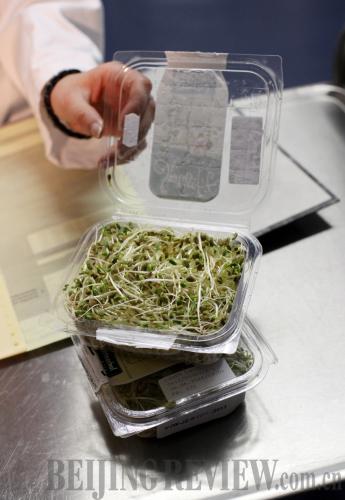|
 |
|
POISONOUS SPROUTS: German health authorities confirmed in Berlin on June 10 that bean sprouts were the cause of the recent E. coli outbreak (XINHUA/AP) |
A direct result of this globalized food supply is the globalization of food safety problems.
As the above examples demonstrate, consumers in one country or region are becoming increasingly vulnerable to food problems in other countries and regions, so much that it is no longer appropriate to consider a food safety crisis solely a Chinese, Japanese or German problem. Moreover, the globalized food supply is often associated with the so-called "Wal-Mart effect": The huge buying power of large, vertically integrated multinational corporations and their razor-thin profit margins tend to generate strong cost-cutting pressures on their overseas food suppliers and manufacturers who often find it tempting to turn to unsafe or substandard materials in searching for ways to lower manufacturing costs.
The effect can be aggravated by agricultural production practices in certain countries, where large numbers of small farms combined with weak local food safety regulation encourage the heavy use of pesticides, fertilizers, antibiotics and illegal additives. In Taiwan, for instance, DEHP has been added to an emulsifier as a cheap substitute for the more expensive palm oil. These trends make a food safety scare or scandal more likely.
Regulatory alliance
The globalization of food supply over the past decades has lengthened and complicated the supply chain. One study showed a single cheese burger could be made up of constituents from as many as 54 different countries. Given the incredibly complex sourcing of food ingredients and the lack of cooperation between food processors and their overseas suppliers, it is increasingly difficult to fully trace food from farm to fork.
No wonder German health authorities were unable to pinpoint exactly the source of the outbreak even weeks after the initial E. coli infection.
The pressures of globalization stretch existing national food safety regulation systems beyond their designed capacities. It is simply impossible for national regulators to inspect every plant of every country in every locale. Indeed, as suggested in the European E. coli scare, even so-called "golden standards" cannot guarantee food safety if they only focus on domestic inspection activities. As the head of a Russian consumer protection agency observed, "This shows that Europe's lauded health legislation—one which Russia is being urged to adopt—does not work."
Investment in national food safety regulatory systems cannot catch up with the pace and scale of the transformation of food production and distribution. At a recent meeting at the Council on Foreign Relations, Margaret Hamburg, Commissioner of the U.S. Food and Drug Administration (FDA), reiterated her conviction no amount of national legislation could guarantee food safety.
Indeed, even today, the FDA is still plagued by a lack of adequate regulatory power, funding and independence in regulating and supervising the safety of food. This is believed to be the cause of regulatory negligence over a large array of food products affecting the health and lives of American people.
For a developing nation such as China, it is imperative to strengthen domestic regulatory capacity in order to narrow the gap between the increasingly globalized food supply chain and the still underdeveloped domestic regulatory institutions. But even with significantly expanded capacity, China is unlikely to be able to fully guarantee food safety unless it actively engages all critical stakeholders.
Building China's regulatory capacity therefore means building more effective partnerships and institutions internationally. This involves efforts to harmonize food safety standards, bolster China's partnership with national and international regulators such as the WHO, the WTO and the FAO and share information on food processing, distribution and regulation. Bringing together what the FDA's Margaret Hamburg has termed an alliance of regulators, political leaders, citizen consumer organizations and commercial leaders for genuine and open dialogue—possibly at the next G20 Summit—is the first step toward achieving this objective.
The author is a senior fellow for global health with the U.S. Council on Foreign Relations and an associate professor with the John C. Whitehead School of Diplomacy and International Relations at Seton Hall University
(Viewpoints in this article do not necessarily represent those of Beijing Review) | 